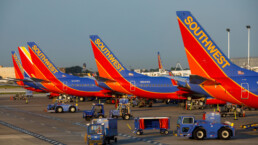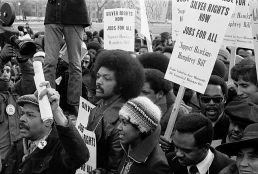Our system is set up to create mutual antagonism between members of the working class. Meanwhile, faceless corporate executives remain shielded like mob bosses.
by Adam Johnson, The Column
Recent viral images of Southwest agents getting yelled at and crying have resurfaced a valuable lesson about the nature of our economic system that’s worth examining this holiday season: the deliberate, built-in ways corporate “customer service” is set up to not only shield those on the top of the ladder—executives, vice presidents, large shareholders—but pit low-wage workers against each other in an inherently antagonistic relationship marked by powerlessness and frustration. It’s a dynamic we discussed in “Episode 118: The Snitch Economy—How Rating Apps and Tipping Pit Working People Against Each Other,” of the Citations Needed podcast I co-host, but I feel ought to be expanded on in light of recent events. Watching video after video, reading tweet after tweet, describing frustrated stranded holiday travelers yelling at Southwest Airlines workers, and hearing, in turn, accounts of airline workers and airport staff breaking down crying, is a good opportunity to talk about how none of this is natural or inevitable. It is a choice, both in corporate policy and government regulation.

There are three main ways capital pits workers against each other in the relationship we call “customer service”:
1. Snitch economy. As discussed in Citations Needed Ep. 118, we are provided with more and more apps, websites, and customer surveys to effectively do the job of managing for management—free of charge, of course. Under the auspices of “empowering” the consumer, we are told to spy on our low-wage servants and gauge the quality of their servitude with stars, tips, and reviews. Uber, DoorDash, Fiver, Grubhub—a new “gig economy” has emerged that not only misclassifies workers as freelancers to pay them less, but hands over the reins of management to the consumer directly. This necessarily increases the antagonism between working-class consumers and the workers they are snitching on.
2. Automation. Increasingly, even getting to the bottom rung employee to yell at is difficult. Under the thin pretense of Covid, increased labor power has exploded the use of automated technology that creates a frustrating maze to get a simple problem solved or task accomplished. Don’t go to the register, instead download the app and order. Scan the QR code, don’t wait on hold, go to our website and engage a series of automated prompts and maybe you can solve your problem. More and more consumers are being pushed away from humans onto automated systems we are told will “save us time,” but instead exist solely to save the corporation labor costs. So, by the time the average consumer does finally work their way to seeing a human, they are annoyed, frustrated, and angry at this faceless entity and more willing to take it out on someone making $13 an hour.
Recent Posts
The Left Owes a Lot to Jesse Jackson
February 19, 2026
Take Action Now As a movement builder, spokesperson, and candidate for the presidency, Jesse Jackson’s accomplishments were massive. He was one of…
Trita Parsi Warns U.S. & Iran Have Incentives to Escalate Conflict
February 19, 2026
Take Action Now “We have a very dangerous situation, because both sides actually believe that a short, intense war may improve their…
Minneapolis: Organizing for the Protection of the Community
February 18, 2026
Take Action Now In speaking with residents in several parts of Minneapolis, beautiful stories of organizing on a block-by-block level emergedBy…
U.S. Sent a Rescue Plane For Boat Strike Survivors. It Took 45 Hours To Arrive.
February 17, 2026
Take Action Now In seas that could kill a person within an hour, it took nearly two days for a rescue plane to arrive.By Tomi McCluskey and Nick…




